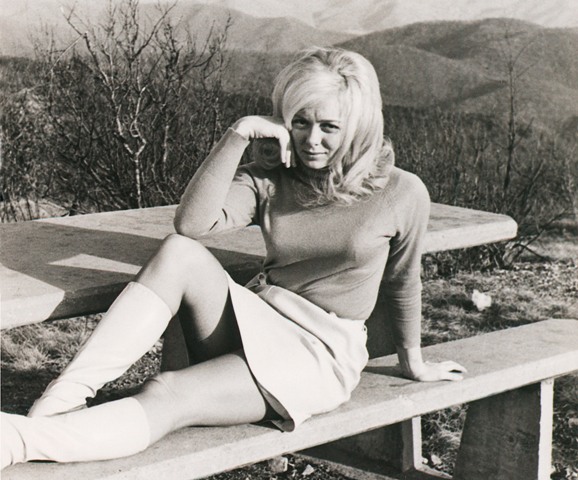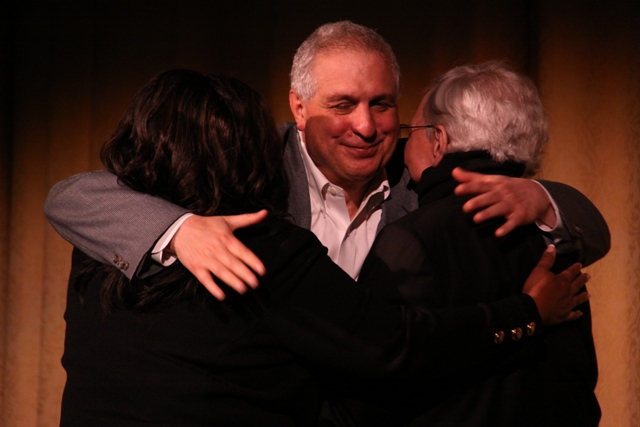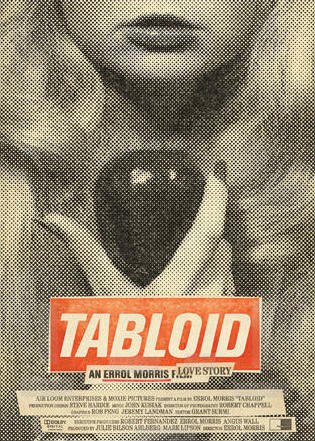Saturday, May 7, 2011
PHOTOS |
COMING SOON|
EXAMINER.COM FILM ARTICLES
||HOME
INTERVIEW
"It's My Best Movie", says
Errol Morris of
A screen shot from "Tabloid", Errol Morris's latest documentary.
by
Omar P.L. Moore/PopcornReel.com
 FOLLOW
FOLLOW
Saturday,
May 7, 2011
SAN FRANCISCO
ERROL MORRIS is relaxed. Super-relaxed.
Sprawled across a comfy-looking sofa -- almost levitating in it -- he's talking
into a telephone. His frequent film producer and friend Julie Ahlberg is
vigorously giving him a "wrap it up" hand signal.
Errol Morris
talks right through it.
The award-winning filmmaker would be the first to admit: if he drove through
stop signs as much as he talked through them he'd have his fair share of traffic
accidents.
The interviewer watches the director as he talks, keenly aware that he's being
waited on. It's an entertaining scene, a movie in and of itself.
Three more minutes pass. Mr. Morris relents as Ms. Ahlberg, a sprightly,
energetic and charismatic figure looks set to wrestle the phone from Mr.
Morris's grasp. She's seen this movie many times. A publicist stands
close by, waiting for the right moment to introduce Mr. Morris's guest.
Errol Morris is always talking. And thinking. And talking.
He'll interrupt himself as he talks. He's unscripted, which means that any
journalist -- or anyone, period -- will get more than their money's worth when
engaging with him. Twenty minutes very quickly becomes an hour, though
never a boring hour.
Mr. Morris is fascinated with life and its complexities. His
stream-of-consciousness philosophizing and conversation are not a show to flaunt
or boast intellectual prowess, but rather an exploration of how he looks at the
world -- a study of how he sincerely wrestles with and analyzes human behavior
and the human condition. Mr. Morris could be an archaeologist and
anthropologist but he does both jobs, it seems, as a filmmaker.
On this sunny lunchtime afternoon Mr. Morris is on the fifth floor suite of a
hotel that has become a home away from home. It's clear he loves talking
about his new documentary "Tabloid", which he calls his "best movie".
There's a playfulness to "Tabloid", which played this week at the
54th San
Francisco International Film Festival. The documentary played
at the Toronto International Film Festival in 2010 and at South By Southwest
this year.
There's a horrific element to "Tabloid". This observation is conveyed to
Mr. Morris.
"The story is about a man who is stalked by a woman -- in part -- that's not the
whole story but that's an element of the story. Is that kind of
frightening for a man? Well why wouldn't it be!"
When a bias is quasi-confessed, the loquacious filmmaker steps in as if to
reassure.
"Well of course, we all have biases."
There's a brief pause. Mr. Morris, dressed in his trademark white shirt
with top button fastened and khaki pants, leans forward to drink the tea sitting
on a coffee table.

Joyce McKinney posing in a photo
seen during "Tabloid", Errol Morris's latest documentary.
Courtesy: S.F. Film Society
"There's so many different elements to the story. I think it's a crazy
story. And a complex story. And Joyce is a complex character."
"Joyce" is Joyce McKinney, a North Carolina-born former beauty queen with a 168
I.Q. Ms. McKinney made headlines in England and the world in 1977 when she
and a male accomplice flew to England and kidnapped Kirk Anderson, a Mormon
student she loved dearly, taking him from Surrey, south east of London, to
Devon, some 250 miles south west. The British media dubbed the incident
"The Case Of the Manacled Mormon", citing Mr. Anderson's being tied to a bed at
a cottage in Devon. Mr. Anderson said he was raped by Ms. McKinney at the
cottage. Ms. McKinney said she seduced Mr. Anderson and had sex with him
over a three-day period.
"Tabloid" explores this angle, plus the love story, celebrity and the press.
The film features interviews with Ms. McKinney, a McKinney friend and planner,
and several British journalists from the then-notorious Daily Mirror newspaper
and the more conservative Daily Express. Mr. Morris weaves a "Rashomon"-like
element throughout, but despite some of the more lurid events, there's a deep
undercurrent of horror that recalls
"Standard Operating Procedure" and the
grimness and pain of "The Thin Blue Line". But "Tabloid", which debuted at
the 2010 Toronto International Film Festival is perhaps a close cousin to Mr.
Morris's last love story documentary "Gates Of Heaven" (1978).
Mr. Morris admits he "still doesn't know what the story is about, because
there's more than one."
As always the Massachusetts-based filmmaker speaks in a reflective, deliberate
voice.
"I like to think of myself as a purveyor and a connoisseur of irony, and this
(story) is just filled with endless ironies."
This comment spurs Mr. Morris on. It's as if he's never satisfied with the
statement delivered or answer he's just given. Or many of his answers.
Mr. Morris is calm but he's intellectually restless, always searching.
When he's found it -- that eureka moment when he's put his finger squarely on
the pulse of something -- he shakes it off like a baseball pitcher shakes off a
catcher. The answer sometimes isn't enough for the filmmaker of the
Oscar-winning documentary "The Fog Of War". Curiosity beckons Mr. Morris
to go beyond himself.
"It's a very deep and complex story about people and about love."
There's also a caution to what Mr. Morris says. He pauses and
contemplates, as if to let what he has just said sink in.
"I always worry what Roger is going to think because he's been the champion of,
God knows, from my first movie on of my work. And I said, 'you know, this
is my first love story since 'Gates Of Heaven'.' And he watched and he
said, 'yes, it's a love story, but it's a love story only Errol Morris could
make.' It still is perhaps my favorite comment on the movie. I love
Roger."
Mr. Morris was here in San Francisco just one year ago for the S.F. Film
Society's special
Mel Novikoff Award gala for America's pre-eminent film critic Roger
Ebert at the 53rd San Francisco International Film Festival. Mr. Ebert's
new weekly movie review PBS television show "Ebert Presents At The Movies" (for
which this writer is a contributing critic) has become part of the national
landscape once again, as "Siskel And Ebert" had for years in the past.

Errol Morris embraces Chaz and
Roger Ebert last year in San Francisco during the
53rd S.F. Int'l Film Festival, at the Castro Theatre.
Omar P.L. Moore/PopcornReel.com
"He's such a powerful critic. He'll always wonder, 'everything you say, is
it sucking up, is it just saying these things?', because Roger is so powerful
and so influential. And the truth for me is that it's nothing about that.
Roger -- and Gene Siskel were there very early on for me. And have played
over the years a really, really significant role in my life. I owe them a
lot. And I like [Roger] a lot. He's just one plain good guy.
And a courageous guy."
Already -- at least it feels sooner than it should -- the publicist who was
standing on guard earlier has entered the room and quickly given a five-minute
signal.
Mr. Morris and his questioner have only just scratched the surface.
Yet Mr. Morris has said so much already.
"I always feel I've been making quirky films, films that are unexpected.
Films that take sudden left or sudden right turns that head off into the ozone.
Sometimes you're aware of it more than others. But it's been true of
everything. It was true of 'Fog Of War', it's true of 'Standard Operating
Procedure'. It's true of 'Thin Blue Line'. And there are elements of
absurdity in all of those movies as well. But this is a return to
something that I know and I love: the crazy true story. And I'd like to do
more of them. I think it's my best movie."
"Tabloid" is a fascinating movie and Mr. Morris is fascinated about it.
"Getting lost inside of yourself is to me a very frightening idea, something
that I personally worry about. To make these things you have to on some
level -- I have to identify with the people I am making the movie about.
It doesn't matter whether it's Lyndee England or Sabrina Harman or Robert S.
McNamara or Joyce McKinney, I have to see them as real complex and interesting
people."
As he talks about Ms. McKinney, Mr. Morris solicits the opinion of Mark Lipson,
another producer of "Tabloid", who has been seated in the distance in the
voracious suite. Mr. Lipson looks to be in his mid-to-late fifties and has
a shock of white hair. For several minutes during the interview he has
been quietly typing on a laptop perched on a desk.
"We've all agreed -- Mark, is this your view originally? -- that she should be
given an Oscar --"
"Yes," replies Mr. Lipson.
"If she was, if she was a thespian -- if she was an actor instead of a
quote-unquote real person -- whatever that may be -- SHE SHOULD GET AN OSCAR!"
Mr. Morris shouts across the room to his producer.
"If they gave -- if they gave a best performance in a documentary, Joyce
McKinney would get it," Mr. Lipson reaffirms.
Everyone in the room agrees.
Joyce McKinney, like many of us, has a dimension of personas. She is now
in her sixties. In "Tabloid" she easily passes for forty-something.
Ms. McKinney has a sharp, cheeky sense of humor, charm and an easy smile.
She comes across without an abundance of self-awareness, and a comment that Mr.
Lipson makes appears to reinforce Ms. McKinney's aloofness.
"Essentially, you know, she always said to Errol and I she wants us to clear her
name -- and this is from somebody who used an alias for 25 years. I'm not
sure whose name she wanted to clear."
Mr. Morris first learned of Ms. McKinney when he came across a newspaper article
about someone cloning a dog she had loved. From there the filmmaker
backtracked.
"She had identified herself in that article I believe, as Joyce Bernann.
And the article mentioned that she might be connected with the Joyce McKinney
from the sex-and-chains story, blah, blah, blah, blah, blah. We didn't
know until much later that Joyce McKinney and Joyce Bernann were one and the
same."

A movie poster of "Tabloid", Errol
Morris's latest documentary.
Errol Morris revisits the question of horror in "Tabloid" -- the story's
undertones that give it a coldness, creepiness and danger. It's a question
that he's probably been ruminating on from the start of the conversation.
"Someone said to me very early on, what did I think about Joyce's craziness --
how crazy she was. And without disagreeing I said, 'she is no more or less
crazy than the men in this movie.'
"They're all crazy! Men clearly -- and I have to include myself
-- were drawn in to this crazy story. She always was able to -- and
still is able to -- attract people to her story, whether it was the gossip
columnist from the tabloid newspaper in Britain or whether it's Errol Morris
comma filmmaker or whether it's the Korean doctors who agreed to clone her dog.
She's always had a way of getting men to do her bidding, perhaps with the
exception of Kirk Anderson."
Mr. Morris tried to get Mr. Anderson for an interview. Mr. Anderson
wouldn't return phone calls to the filmmaker. Mr. Morris said he wished to
get K.J., Ms. McKinney's good friend and accomplice, but K.J. passed away in
2004.
"Mark, Mark can testify to this -- the guy Steve Moskowitz --"
Mr. Morris is interrupted.
"We really did -- I found a British reporter who took him to Mexico . . . Steve
Moskowitz didn't leave a big footprint," Mr. Lipson added, saying they were
considering running a contest to locate Mr. Moskowitz, a reputed love interest
of Ms. McKinney.
"He didn't leave any footprint at all," Mr. Morris corrects.
"True crime is a sort of historical investigation," Mr. Morris instructs
his listener.
"You're trying to find out what happened in the past. And often you're not
playing with a complete deck. There are cards missing. When were
were doing Standard Operating Procedure often I'd hear the criticism, 'okay, you
didn't interview the victims -- you didn't interview the people who were in
those cells . . . and in particular you didn't interview the man who was known
as Gilligan -- the man who's under the hood.' The man who was in the
most famous photograph taken during the Iraq war -- the hooded man on the box
with wires.
"A photograph which is literally known by billions upon billions of people."
Suddenly Mr. Morris is solemn.
"I've often said that when we remember this war, a hundred, two hundred years
from now, that will still remain the central image."
The defining moment?
"The defining moment. For better or for worse, whether we like it or not."
Mr. Morris wrestles himself again in a way but to get the next amplified point
across.
"People say, 'well, why should that be the iconic image?' WELL I
DIDN'T PICK IT! YOU KNOW? DON'T BLAME ME! IT JUST IS!"
Then in a voice that is decibel compliant Mr. Morris adds, "I don't make the
decisions about what is iconic and what is not."
The filmmaker said that he was still trying to get to interview the man in the
hood.
"I have a book coming out -- you know, I'm now starting this career as a writer.
I have my first book coming out from Penguin in the Fall about photography
called Believing Is Seeing, and one of the essays is about the hooded
man from Abu Ghraib. If you can't get a hold of those people, what do you
do? You can't interview Kirk Anderson. K.J. is dead. Steve
Moskowitz is nowhere to be -- he's AWOL -- you spend this enormous amount of
effort trying to find him but you just come up empty-handed."
Mr. Morris tells several anecdotes. One includes what he said was his
"snotty tone" to a student in a Massachusetts school (namely Harvard) who asked
him why Robert McNamara was important. As Ms. Ahlberg and the publicist
hover close by, the filmmaker goes on about this episode for several minutes.
Ms. Ahlberg even assists Mr. Morris in telling the story, either because she
finds it amusing (which it is) or because she wants to get Mr. Morris to stop
talking to accommodate a waiting journalist who has already walked into the
room.
"Okay, I'll finally shut the fuck up now!" Mr. Morris later says.
"I'm an investigator at heart. I will dig and scratch in the dirt trying
to find whatever it is I can find. But I don't always come up with the
goods. I've been lucky. I came up with the goods in 'The Thin Blue
Line'. I got those people on film. The people that I needed to get
on film, I got on film. I was very, very, very, very lucky."
"Tabloid" opens in San Francisco on July 15.
 FOLLOW
FOLLOW
SUBSCRIBE TO THE POPCORN REEL MOVIE
REVIEWS RSS FEED
